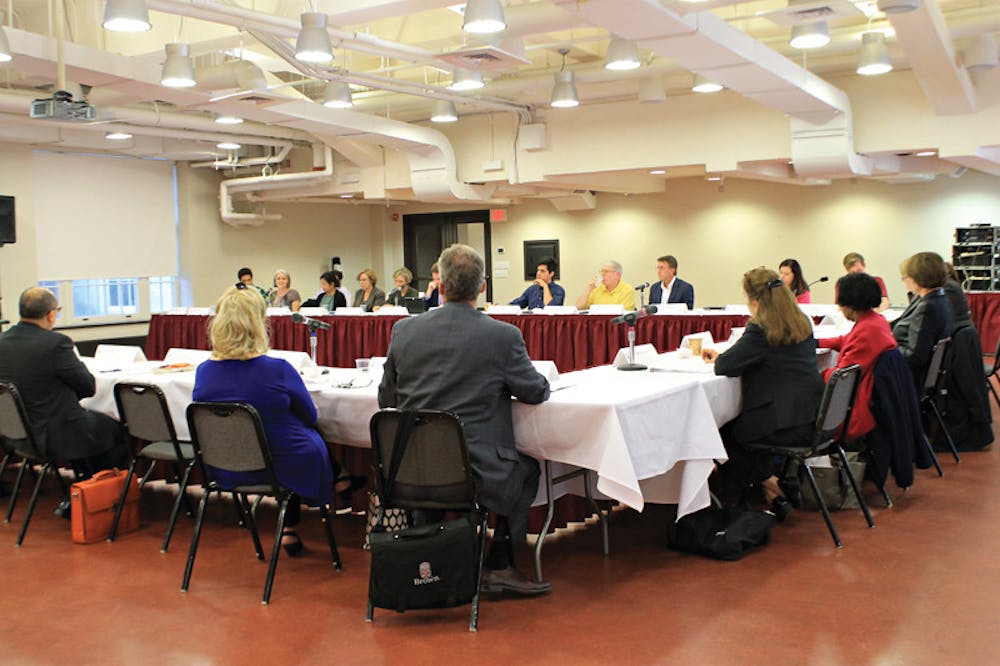The Brown University Community Council laid out plans Thursday for a sexual assault task force, as well as for programs that aim to promote discourse about privilege, power and oppression following the Ray Kelly incident last October, addressing two topics that sparked heated campus controversy last year.
Over the summer, Justice Gaines ’16, Adam Kemerer ’15 and Yvonne Yu ’14.5 worked with administrators to identify improvements that could be made to the University’s practices concerning sexual assault, said Frances Mantak, director of health promotion.
Gaines, Kemerer and Yu found three principal weaknesses in the University’s approach, Gaines said. They recommended that the task force improve the clarity of information about sexual assault policies distributed by the University; reform the hearing, appeals and sanctioning processes; and educate sexual assault case board members about narratives of privilege and discrimination, Gaines added.
Gaines said the students suggested the University assign the processes to a board. In the past, appeals decisions have fallen on the office of Margaret Klawunn, vice president for campus life and student services.
The University should also work to address the role of socioeconomic status in these processes, Gaines said. Students with great financial resources can afford lawyers who help them succeed more easily, he added, and administrators must be aware of this and similar advantages when making disciplinary decisions.
President Christina Paxson suggested that students receive “reorientation” about sexual assault at some point after their first week at Brown. Currently, mandatory sexual assault training for all students ends after first-year orientation.
A few changes to the University’s approach to sexual assault prevention have already taken effect. The University added dating violence issues to residential peer leader training in August, required that first-years watch a video on sexual assault before coming to campus and revamped the unit meeting all first-years must attend after an orientation event on sexual assault, Mantak said.
The University also hired Marc Peters as men’s health coordinator and has started the search for a full-time Title IX program officer. The University has received about 25 applications for the position but will continue searching until the best possible candidate is found, said Liza Cariaga-Lo, associate provost for academic development and diversity.
Dialogue then shifted to the shutdown of the planned lecture by former New York City Police Commissioner Kelly last year, as Committee on the Events of October 29 members Dakotah Rice ’16, Lakshmi Padmanabhan GS and Philip Gruppuso, professor of pediatrics, biology, molecular biology and biochemistry, summarized the findings of the committee’s second report.
When bringing speakers to campus in the future, the University should pay close attention to the framework in which conversations occur, Padmanabhan said.
“There were blind spots … in how Kelly was brought here,” Gruppuso said, adding that the way the University framed the event was “honorific.” Doing so was a poor decision, given that members of the community found the policies Kelly implemented “dangerous,” he said.
The University must “use this moment to establish some sense of continuity” by “institutionalizing spaces” for open conversations about privilege and oppression, Padmanabhan said. Consistent conversations of that kind would mitigate misunderstandings that fueled the hostility on campus before and after the Kelly event, she added.
The committee did not recommend policy changes that would modify the logistics of bringing a controversial speaker like Kelly to campus in the future.
“I don’t think there’s anything we could have discovered that would make it easier to bring a controversial person to campus,” Gruppuso said.
“This wasn’t an issue of policy,” Gaines said. “It was an issue of power, and privilege and equity, which was never addressed.” He added that the University should “not talk about whose freedom of speech we’re infringing,” but rather whom the University can empower to speak.
An earlier version of this article incorrectly stated that Justice Gaines '16 said the University should ensure that privileged perpetrators do not gain an unfair advantage in disciplinary processes. In fact, he said it should acknowledge the role socioeconomic status may play in giving alleged perpetrators or victims an advantage. The Herald regrets the error.

ADVERTISEMENT




